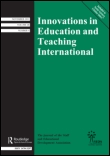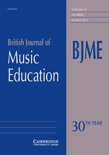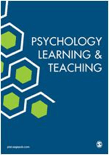
International Journal for Technology in Mathematics Education
Scope & Guideline
Connecting research and practice in math education technology.
Introduction
Aims and Scopes
- Integration of Technology in Mathematics Teaching:
The journal emphasizes the use of various technological tools, such as GeoGebra, augmented reality, and digital platforms, to facilitate innovative teaching practices and improve student engagement in mathematics. - Research on Pedagogical Approaches:
A core focus is on researching and developing pedagogical strategies that effectively incorporate technology into mathematics education, aiming to enhance understanding and problem-solving skills among students. - Explorations of Mathematical Concepts:
The journal encourages studies that explore mathematical concepts through digital means, including dynamic geometry environments and interactive learning experiences, to foster deeper comprehension. - Professional Development for Educators:
A significant aspect of the journal is the research and discussion around professional development programs that prepare educators to effectively use technology in their teaching practices. - Assessment and Evaluation in Technological Contexts:
The journal includes studies assessing the impact of technology on student learning outcomes, as well as innovative approaches to evaluating mathematical understanding and skills.
Trending and Emerging
- Augmented Reality and Interactive Learning:
There is a rising trend in the exploration of augmented reality as a tool for enhancing student engagement and understanding of mathematical concepts, showcasing its potential in transforming traditional learning environments. - Collaborative and Community-Based Learning:
Emerging themes focus on collaborative learning experiences, including community-based STEM projects that leverage technology to foster teamwork and practical applications of mathematics. - Focus on Student-Centered Learning:
Recent papers emphasize student perspectives and experiences in learning mathematics, highlighting the importance of adapting teaching methods to meet diverse learner needs in technology-rich environments. - Integration of STEAM Education:
The integration of STEAM (Science, Technology, Engineering, Arts, and Mathematics) approaches is gaining traction, showcasing interdisciplinary methods in teaching mathematics through creative and contextual applications. - Professional Development and Teacher Training:
There is an increasing emphasis on professional development initiatives aimed at equipping educators with the skills and knowledge to effectively integrate technology into their mathematics instruction.
Declining or Waning
- Traditional Teaching Methods:
There is a noticeable decline in publications centered around traditional, non-technological methods of teaching mathematics, indicating a shift towards more innovative and technology-driven pedagogies. - Purely Theoretical Mathematical Research:
Papers focusing solely on theoretical mathematics without a strong connection to educational technology or practical application in teaching are becoming less frequent, suggesting a move towards applied research. - Static Assessment Techniques:
The use of static or conventional assessment techniques in mathematics education is waning, as the focus shifts toward dynamic and interactive assessment methods that leverage technology.
Similar Journals

INNOVATIONS IN EDUCATION AND TEACHING INTERNATIONAL
Fostering global discourse on teaching innovations.INNOVATIONS IN EDUCATION AND TEACHING INTERNATIONAL, published by Routledge Journals, Taylor & Francis Ltd, is a premier, peer-reviewed journal dedicated to disseminating cutting-edge research and best practices in the field of education. With an impressive Q1 category ranking in Education, this journal is recognized for its influential contributions, boasting a Scopus Rank of #288 out of 1543 in Social Sciences – Education, placing it in the 81st percentile of its category. Established in 1996 and continuing to thrive through 2024, INNOVATIONS IN EDUCATION AND TEACHING INTERNATIONAL focuses on fostering scholarly discourse around emerging educational methodologies, pedagogical innovations, and the integration of technology in teaching. As an open-access journal, it ensures that groundbreaking research is accessible to a global audience, empowering educators, researchers, and policy-makers to enhance teaching and learning experiences. By publishing high-quality, empirical studies and theoretical contributions, this journal plays a vital role in shaping the future of education.

International Journal of Science and Mathematics Education
Empowering Educators Through Innovative ResearchWelcome to the International Journal of Science and Mathematics Education, an esteemed publication that has served as a vital platform for cutting-edge research in the fields of science and mathematics education since its inception in 2003. Published by SPRINGER in the Netherlands, this journal has consistently established itself in the top tier of academic publishing, as evidenced by its ranking in the Q1 category for both Education and Mathematics (miscellaneous) in 2023. With an impressive Scopus ranking placing it at #26 in General Mathematics and #269 in Social Sciences Education, the journal is a must-read for researchers, educators, and policymakers dedicated to enhancing the teaching and learning of mathematics and science. Although not open access, the journal is committed to disseminating high-quality research that bridges theory and practice, fostering innovative approaches and collaboration within the academic community. By supporting empirical studies, methodological advancements, and theoretical discussions, the International Journal of Science and Mathematics Education plays a crucial role in shaping educational practices and policies worldwide.

MIER-Journal of Educational Studies Trends and Practices
Advancing educational excellence through innovative research.MIER-Journal of Educational Studies Trends and Practices is a pivotal academic journal dedicated to advancing the field of education, focusing on innovative research and trends that influence teaching and learning practices. Published by the esteemed MODEL INST EDUCATION & RESEARCH, this journal offers a platform for researchers, educators, and students to disseminate knowledge and insights on various educational methodologies, curricular developments, and pedagogical theories. While the journal's current impact factor is not specified, its commitment to fostering scholarly discourse positions it as a notable contributor to the field. With an ISSN of 0976-8203 and an E-ISSN of 2319-1945, MIER aims to promote open access to current educational research, making it accessible to a global audience. By engaging with contemporary educational issues and emerging practices, this journal serves as a valuable resource for those dedicated to enhancing educational outcomes and developing effective teaching strategies.

British Journal of Music Education
Advancing the Harmony of Music EducationBritish Journal of Music Education is a prestigious academic publication dedicated to advancing the field of music education. Published by Cambridge University Press, it benefits from a notable impact factor that positions it in the Q2 category in Education and the Q1 category in Music as of 2023. This journal serves as a vital platform for researchers, educators, and students alike, focusing on innovative research, pedagogical studies, and theoretical discussions that shape the practice of music education globally. Since its inception in 1984, the journal has contributed significantly to the understanding of music pedagogy and continues to be relevant and influential, currently spanning the years from 1984 to 1998 and 2007 to 2024. With impressive rankings, including rank #16/180 in Arts and Humanities (Music) and rank #669/1543 in Social Sciences (Education) on Scopus, it highlights the journal's commitment to scholarly excellence. Though it does not currently offer open access, its contributions are an essential resource for anyone involved in the education landscape of music.

Teaching of Mathematics
Elevating Mathematics Education Through Research and InnovationTeaching of Mathematics is an esteemed open-access journal devoted to the field of mathematics education, published by DRUSTVO MATEMATICARA SRBIJE in Serbia. Since its inception in 1998, the journal aims to foster scholarly dialogue and disseminate research findings that contribute to the effective teaching and learning of mathematics. Although it currently holds a Q4 ranking in both Education and Miscellaneous Mathematics categories, the journal is dedicated to providing a platform for innovative pedagogical strategies, theoretical discussions, and empirical studies. With an ISSN of 1451-4966 and an E-ISSN of 2406-1077, Teaching of Mathematics offers open access to its content, ensuring that researchers, educators, and students can freely benefit from its contributions. As it converges towards 2024, the journal aspires to enhance its impact and influence within the mathematical education community, encouraging all stakeholders to share their insights and advancements in this critical area of study.

Psychology Learning and Teaching-PLAT
Unlocking potential through research-driven teaching methodologies.Psychology Learning and Teaching (PLAT) is a distinguished academic journal published by SAGE Publications Ltd, dedicated to advancing the field of educational psychology. With an ISSN of 1475-7257 and an E-ISSN of 2057-3022, this journal serves as a vital resource for researchers, educators, and practitioners seeking to explore innovative teaching methodologies and learning strategies within the context of psychology. As of 2023, its reputation is underscored by its Q1 ranking in Education and Q2 ranking in Psychology (miscellaneous), reflecting its significant contributions to the scholarly community. Placing an emphasis on empirical research and practical application, PLAT publishes research that not only enhances educational practices but also addresses contemporary psychological issues. Open access options facilitate widespread dissemination of knowledge, while its robust impact factor highlights its influence within the educational and psychological discourse. This journal is essential for anyone committed to the intersection of psychology and education, providing thought-provoking insights that inspire ongoing dialogue and development in the field.

Chemistry Teacher International
Empowering Educators Through Open Access ResearchChemistry Teacher International is a prominent peer-reviewed journal dedicated to the field of chemistry education, published by WALTER DE GRUYTER GMBH. With its Open Access policy since 2018, this journal ensures that research is widely disseminated to educators, researchers, and practitioners globally. Located in Berlin, Germany, it aims to promote innovative teaching methodologies and practical applications in chemical sciences. The journal has consistently achieved a Q2 ranking in both the Chemistry (Miscellaneous) and Education categories as of 2023, reflecting its relevance and impact within the academic community. Over its converged years from 2019 to 2024, Chemistry Teacher International fosters a collaborative platform for sharing research, insights, and pedagogical strategies, thereby contributing to the advancement of chemistry education on a global scale.

STUDIA MATHEMATICA
Pioneering New Directions in Mathematical ScholarshipSTUDIA MATHEMATICA is a distinguished journal published by the Polish Academy of Sciences Institute of Mathematics - IMPAN, dedicated to advancing the field of mathematics since its inception. With an ISSN of 0039-3223 and an E-ISSN of 1730-6337, this journal serves as a significant forum for mathematicians worldwide to disseminate innovative research and theoretical advancements. Operating under a stringent peer-review process, STUDIA MATHEMATICA boasts a commendable impact factor that places it in the Q2 category within the mathematics discipline, indicating its critical role in the academic community. Covering a broad spectrum of mathematical topics, the journal aims to encourage interdisciplinary collaboration and foster a deeper understanding of both applied and theoretical aspects of mathematics. Researchers, professionals, and students alike will find a wealth of knowledge in its pages, contributing to the development of the mathematics field from its base in Warsaw, Poland. As it converges various strands of mathematical thought from 1996 to 2024, STUDIA MATHEMATICA continues to uphold its reputation as an essential resource for contemporary mathematical scholarship.

REDIMAT-Revista de Investigacion en Didactica de las Matematicas
Advancing the Frontiers of Mathematics EducationREDIMAT-Revista de Investigacion en Didactica de las Matematicas, published by HIPATIA PRESS, is a leading open-access journal dedicated to advancing research in mathematics education, particularly focusing on didactic methodologies and pedagogical innovations. Since its inception in 2012, the journal has fostered an inclusive platform for academics, educators, and practitioners to disseminate their findings and insights, significantly contributing to the field of mathematics education. With an ISSN of 2014-3621, REDIMAT aims to promote high-quality research and collaboration across diverse educational contexts. The journal not only emphasizes empirical studies but also theoretical developments and practical applications that enhance teaching and learning of mathematics worldwide. By providing a valuable resource for researchers, professionals, and students alike, REDIMAT plays a pivotal role in shaping the future of mathematics education research.

Journal of Computers in Education
Empowering Education through Innovative Technology.The Journal of Computers in Education is a distinguished academic journal published by SPRINGER HEIDELBERG, dedicated to advancing the intersection of technology and pedagogy. With an ISSN of 2197-9987, this journal has established itself as a pivotal resource for researchers and educators alike since its inception in 2019, maintaining a strong focus on innovative applications of computer science within educational contexts. Ranked in the Q1 category in both Computer Science Applications and Education, the journal demonstrates a high impact in its field, holding a remarkable position within the top 1.5% of journals in social sciences (rank #20/1543) and top 5.5% in computer science applications (rank #45/817). The journal's scope encompasses a wide range of topics including but not limited to educational technologies, e-learning methodologies, and the effective integration of computers in teaching, making it an essential source for professionals and students who are keen to explore cutting-edge research and trends. Although access options vary, the journal's commitment to disseminating quality research continues to enrich the academic landscape in Germany and beyond, nurturing the synergies between education and technology.